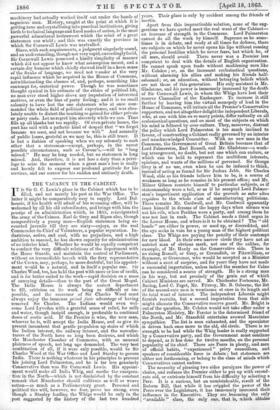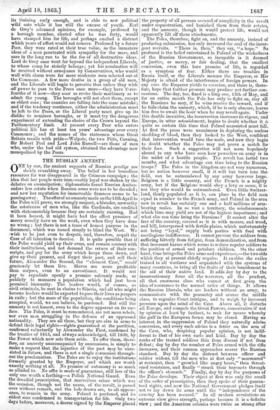THE VACANCY IN THE CABINET.
TT is Sir G. C. Lewis's place in the Cabinet which has to be 1 filled, and not merely his post at the War Office. The latter it might be comparatively easy to supply. Lord Dal- housie, if his health will admit of his resuming office, will be welcomed by all his old subordinates, and brings with him the prestige of an administration which, in 1855, reinvigorated the army of the Crimea. Earl de Grey and Ripon also, though comparatively a young man—English statesmen being ac- counted juvenile till they are sixty—enjoys, as the real Commander-in-Chief of Volunteers, a popular reputation. In- dustrious, active, and cool, with no prejudices, and a high ambition to succeed, he has shown capacity for administration of no inferior kind. Whether he would be equally competent to conduct the very difficult relations of the department with the Horse Guards, and maintain the control of Parliament, without an irremediable breach with the fiery representative of the Crown, may, perhaps, be more doubtful, but his appoint- ment would be a natural, and in itself a popular one. Sir Charles Wood, too, has held the post with more or less of credit, and is far better suited to the work—rapid decision on a mass of annoying details—than to the part of the Great Mogul. The India House is always the easiest department to fill, criticism on its work being so difficult or im- possible, and the successor of Sir Charles Wood must always enjoy the immense primil fade advantage of having removed Sir Charles. The Indians would even wel- come Lord Lyveden with a grateful sense of relief, for milk and water, though insipid enough, is preferable to continual doses of acetic acid. If the Premier is wise, the new man, whoever he is, will accept the India House, and so give its present incumbent that gentle propulsion up stairs of which the Indian interest, the railway interest, and the manufac- turers of the North have so long been desirous, and which the Manchester Chamber of Commerce, with an unusual plainness of speech, not long ago demanded. The very best combination of all, if it were only possible, would be Sir Charles Wood at the War Office and Lord Stanley to govern India. There is nothing whatever in his principles to prevent his joining Lord Palmerston, and he is far less genuinely Conservative than was Sir dome wall Lewis. His appoint- ment would make all India Whig, and soothe the exaspera- tion in the North—which is not diminished by the constant remark that Manchester should cultivate as well as weave cotton—as much as a Parliamentary grant. Personal and political ties will, however, we fear, prove too strong, even though a Stanley leading the Whigs would be only in the post suggested by the history of the last two hundred years. Their place is only by accident among the friends of inertia.
Apart from this impracticable solution, none of the sug- gestions we have quoted meet the real want of the Cabinet— an increase of strength in the Commons. Lord Palmerston cannot do all the work by himself. Supreme as he some- times is in debate, and ready at all times for defence, there are subjects on which he never opens his lips without rousing the personal hostilies which he never fears, but which he, of all men, should avoid. There never was a Premier less competent to deal with the details of English organization. He cannot speak upon trade without maddening men like Mr. Cobden ; or, on the incessant ecclesiastical questions, without alarmine° his allies and making his friends half- ashamed ; or, on education, without betraying beliefs which are not those of this generation. His only assistant is Mr. Gladstone, and his power is immensely increased by the death of Sir Corn ewall Lewis, in whom the Whigs have lost their reserve Chancellor of the Exchequer. To increase it still further by leaving him the virtual monopoly of lead in the House of Commons, will irritate all the Premier's Conservative supporters, and not altogether delight the independent Liberals, who, at one with him on so many points, differ radically on all ecclesiastical questions, and on most of the subjects on which his mind is fettered by over-culture. They, moreover, distrust the policy which Lord Palmerston is too much inclined to favour, of constructing a Cabinet really governed by an interior and unacknowledged Committee. With no new man in. the Commons, the Government of Great Britain becomes that of Lord Palmerston, Earl Russell, and Mr. Gladstone—a work- ing arrangement, no doubt, but not one which can endure, or which can be held to represent the multiform interests, opinions, and wants of the millions of governed. Sir George Grey is of no use, even when lie can be induced to think, instead of acting as funnel for Sir Joshua Jebb. Sir Charles Wood, able as his friends believe him to be, is a source of weakness as long as he remains in his present office; and Mr. Milner Gibson restricts himself to particular subjects, as if statesmanship were a toil, or as if he accepted Lord Palmer- ston's impertinent application of the proverb as sutor ultra erepidam to the whole eau of manufacturing politicians. There remains Mr. Cardwell, and Mr. Cardwell apparently loses himself in dreams of the happy days when silence was not his role, when Peelites were a party, and among them he was not last in rank. The Cabinet needs a third organ in the Lower House, and where is it to be obtained ? The " old hands " are either in power, or used up, or discredited, and the eye seeks in vain for a young man of the highest political class. The Whigs are paying die penalty of their contempt for new blood. In their own narrow circle they have not an untried man of obvious mark, not one of the calibre, for example, of Mr. Hardy on the Conservative side. There is no rising Russell, or Grey, or Cavendish, or Fitz william or Seymour, or Grosvenor, who would be accepted as a Minister without a start of surprise, and for years they have not made a successful importation, unless indeed the member for Cake can be considered a source of strength. He is a strong man in his way, but not precisely of the grain out of which Cabinet Ministers are carved. Mr. Chichester Fortescue, Mr. Baring, Lord C. Paget, Mr. Fitzroy, Mr. B. Osborne, the list of the second-rate men is wearisome at once in its length and its total want of interest. The independent Liberals might furnish recruits, but a second importation from that side might alienate the Conservative reserve guard. Mr. Bright is out of the question, Mr. Cobden would not take office under- a Palmerston Ministry, Mr. Forster is the determined friend of the North, and Mr. Stansfeld entertains avowed Mazzinian sympathies. The list is soon exhausted, and the speculator is driven back once more to the old, old circle. There is no strength to be had while the Whig leader is really supported by a Conservative party, and the Government must continue to depend, as it has done for twelve months, on the personal popularity of its chief. There are Peers in plenty, and men of official habits, " experienced " privy councillors, and speakers of considerable force in debate ; but statesmen are either not forthcoming, or belong to the class of minds which Conservatives cannot endure.
The necessity of pleasing two sides paralyzes the power of choice, and reduces the Premier either to put up with second- rate aid, or extricate himself from his difficulty by selecting a Peer. It is a curious, but an unmistakeable, result of the Reform Bill, that while it has crippled the power of the Peers over the Legislature, it has immensely increased their influence in the Executive. They are becoming the only "available " class, the only one, that is, w Inch obtains its training early enough, and is able to sow political wild oats while it has still the excuse of youth. Earl `de Grey's advanced opinions, for example, professed by a borough member, elected after he was forty, would have stamped him for life, and perhaps excited a distrust which years of effort would not remove. Professed by a future Peer, they were rated at their true value, as the immature ideas of a man penetrated with sympathy for the mass, and sure in the long run to be the foe of all destructive ideas. Lord de Grey once went far beyond the independent Liberals, to whose camp he strictly belongs; yet his nomination will be received without annoyance by Conservatives, who would wail with alarm were far more moderate men selected out of the Commons. A few more deaths in a group of old men, and the Liberals will begin to perceive that unless they wish .all power to pass to the Peers once more—they have Vireo- fourths of it now—they must so revise their machinery as to -admit the young. The boroughs will not elect them, except as eldest sons ; the counties are falling into the same mistake; -and if the tendency continues, either the administration must be left to the Peers, or the Liberal party must give up its -dislike to nominee boroughs, or it must try the dangerous experiment of extending the choice of the Crown beyond the Parliamentary limit. At present every Peer who enters political life has at least ten years' advantage over every 'Commoner ; and the names of the statesmen whom Great Britain recalls with pride—Walpole, the two Pitts, Canning, „Sir Robert Peel and Lord John Russell—are those of men who, under the bad old system, obtained the advantage now monopolized by the Peers.































 Previous page
Previous page